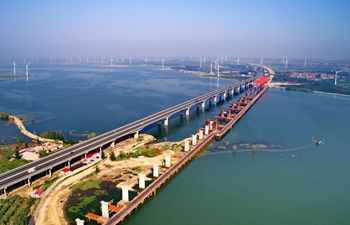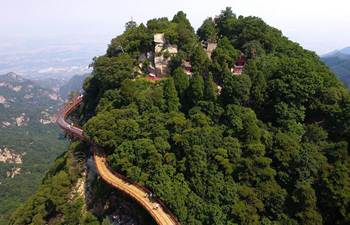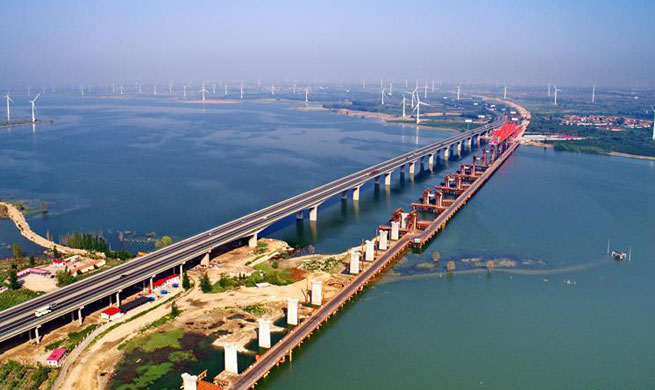FUZHOU, June 28 (Xinhua) -- Walking along the shady zigzagging mountain paths, village head Deng Wenshan recalls a decision made 19 years ago that transformed the mountains and his village.
Deng is the head of Hongtian Village, in east China's Fujian Province. More than 80 percent of the village is forest, an important source of income for around 1,000 villagers.
Back in 1998, Deng was worried that the forests might disappear due to illegal logging.
Though collectively owned by the village, the forests were, in practice, managed by the Hongtian village council, which caused some villagers to feel left out.
"Trees were chopped down 24 hours a day," said Deng. "Mills hired villagers to steal trees and some villagers made huge profits."
The council had neither time nor resources to tackle the illegal loggers and blamed the collective tenure.
"People think that stealing from a collective forest does not count as stealing," Deng said.
After months of preparation and a pow-wow, Deng decided to experiment un privatizing the collective by granting villagers ownership and rights of use of the land.
The practice was adopted nationwide four years later as part of national agrarian reform.
Ownership certificates can be used as collateral for loans. Owners of forests can sell any portion of their rights and the land can be inherited.
"When villagers feel like they own the forests, they stop cutting, and start planting," Deng said. "Everyone becomes a forest ranger."
Once worried about the shrinking forests, Deng has seen the village's forest cover grow by more than half since 1997.
The average villager's income from forestry has also risen from 300 yuan (45 U.S. dollars) in 1997 to over 9,300 yuan in 2016, accounting for 55 percent of their total income.
GREEN PUSH
In recent years, local governments turned to conserving forests with ecological value, many of which were already under private ownership after the 2002 reform.
Luo Yongqin, owner of 200 ha of forest in Yong'an, Fujian Province, was told by the local government not to cut down the trees on some of his land, as part of a plan to limit logging in "key regions": commercial forests along highways, railways, waterways, and in areas of outstanding natural beauty.
Owners receive compensation from the local government at a rate determined by an independent auditor.
In Luo's case, the government redeemed more than 13 hectares forests at an average price of around 92,000 yuan per ha, about 1.2 million yuan in total.
"The price is fair, and I plan to use the money to buy more land," Luo said.
Since 2013, Yong'an has ring-fenced 2,500 ha of forest and is expected to expand that to 60,000 ha.
"The practice in the province is being promoted nationwide," said Yang Min, deputy head of Yong'an forestry bureau. "It is in line with the central government's environmental protection policies."
Boasting of the fifth largest forest area in the world, China aims to expand its forest cover to more than 23 percent by 2020 to combat climate change and soil erosion. The forest coverage was 21.7 percent at the end of 2016.
An increase of 1.4 percentage points means that the forest stock volume rises more than 1.3 billion cubic meters, supporting China's climate change obligation to add around 4.5 billion cubic meters of forest stock volume by 2030.
CARBON RUSH
Forests could absorb about one-tenth of global carbon emissions projected for the first half of this century, according to the UN Food and Agriculture Organization.
Fujian runs one of the eight pilot carbon-trading programs in China. By using the carbon markets, entities can neutralize, or offset, their emissions by retiring carbon credits generated by projects that are reducing emissions elsewhere.
In Yong'an, carbon reduction by afforestation and reforestation entered into provincial carbon reduction programs in 2016.
The city also joined Verified Carbon Standard, a voluntary greenhouse gas program that allows the carbon credit to be traded worldwide.
"To join the programs, forest owners need to sign a contract with local governments promising no logging for twenty years on the contracted land," said Zhan Xinbiao who runs the city carbon-trading program.
It provides extra incentives for farmers to preserve forests, said Zhang. "We have made 4.8 million yuan through these platforms."
China's national carbon-trading market is expected to be launched later this year.
"That will encourage more forest carbon trading nationwide," said Zhan. "When a practice is done well in one place, other places follow suit."

















